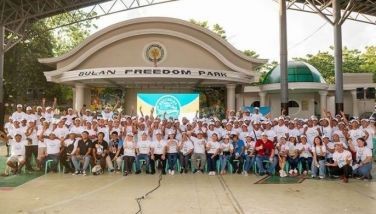The Bar Examinations in Labor laws
Tomorrow morning at eight, this year's Bar Examinations will start. There will be four consecutive Sundays, with two subjects every Sunday. And the first subject will be, as usual, Political Law in the morning and Labor Law in the afternoon. On October 13, it will be Civil Law and Taxation and on October 20, it will be Commercial Law and Taxation. On the last Sunday, October 27, the heaviest of all subjects, in terms of weight, Remedial Law, will be tackled in the morning. In the afternoon, the lightest of them all, Legal Ethics and Practical Exercises will end the ordeal of about six thousand Bar examinees, coming from all over the archipelago, from Batanes to Tawi-Tawi. All examinations shall be held in the hallowed rooms of the University of Sto. Tomas, the oldest and the only pontifical University in Asia.
This columnist has been teaching Labor Laws since 1977, when I had the honor of having as one of my students in The UV Gullas Law School, the incumbent Cebu City Mayor, Atty. Mike L. Rama, as well as the late Press Secretary, Cerge Remonde. Mayor Rama transferred to San Beda and Cerge never became a lawyer but he became famous in ALU and TUCP, in international labor fora, and ultimately as the spokesman of President GMA. In Metro Manila where I had been teaching in UE, FEU and UST, I had the incumbent Undersecretary Becca Chato, the well-known lawyer of the former first gentleman, Ferdinand Topacio and the newly appointed VP of PAL for Human Resources, Atty. Gerry Bautista as my students. Mayor Del de Guzman of Marikina was also my student but he did not take the Bar. Senator Enrile's new lawyer, Atty. Buco Cruz of Bulacan was my student in UST. Another student of mine Arlene Maneja topped the Bar in 2002, with an average of 92.9. She got almost a 100 percent in Labor Law.
Labor Law, as a subject in the Law College and in the Bar Exams has always been misunderstood and underestimated. It has always been considered as a ''minor subject'', compared to Political Law. But this year, there are neither more major nor minor subjects. All subjects now will have allocations of four hours each. This year's chairman is an expert in Labor Law, Justice Arturo D. Brion, who was our Bar Topnotcher in 1974. I took the Bar that year, together with Frank M. Malilong, Celso Espinosa, Recto de Dios, Lloyd Limbaga, Achilles Canete and Annie Pasaylo. I could not afford to pay for the Bar Review in Manila so I reviewed alone along the beaches in Dumanjug, Cebu. Luckily, almost all of us made it and, modesty aside, I got an average of 84.93, despite the fact that I was a working student all the way, like our famous journalist Frank Malilong. We were all clobbered by Taxation but we made good grades in Labor Law.
Labor Law last year was the ''killer subject'', as Taxation was when we took the Bar. Last year, 5,686 law graduates were given the approval to take the Bar. Only 5,343 actually finished the four Sundays of ordeal, many did not appear at all, some stopped after one or two Sundays. The others got sick or just called it quits. Out of 5,343, only 946 passed or a very low passing rate of 17.71 percent. In Labor Law, however, only 165 passed or a negligible .03 percent, a third of one percent. What could have been the reasons for such a disastrous result? The answer of course, is a set of factors that converged, making it very difficult for the examinees. For one, Law graduates do not give Labor Laws the importance that it deserves. Secondly, with all due respect, there are really a few professors who could teach the subject in an excellent way. Thirdly, last year, the Labor Law questions were too long with two examiners collaborating. Fourth, a multiple type of questions are very confusing, with a lot of booby traps. Lastly, they were simply not prepared.
The Bar has produced many famous lawyers. Justice Florenz Regalado of San Beda is credited to have obtained in 1954, the highest grade ever in all history, 96.7 percent. Number 11 in the rank was Paulino Gullas, uncle of Eddiegul, who got 93 percent but he finished his Law studies in UP. Senators Jovito Salonga and Jose W. Diokno tied the fourth place, with 95.3 percent. Salonga was from UP while Diokno was allowed to take the Bar, without a Law degree, the only one ever in history. Senate President Frank Drilon was number three in the 1969 Bar. His classmate Senator Miriam got better grades in college but almost flunked the Bar because she was in love with another classmate, Narciso Santiago from Nueva Ecija. Secretary Leila de Lima was number eight in the 1985 Bar. Senator JPE got 11th place in 1953 with 100 percent in Mercantile Law. Cong Pabling Garcia was third in 1951 and his brother Jesus was 10th in 1946. Pablo John was fourth in 1994.
Dean Teddy Almase of UV Law was fourth in 1964, the daughter of Justice Dicdican, Leonor, was first in 1995. The first barrister who studied outside of Metro Manila, to ever top the Bar was Oscar Globasa from Bohol. Atty. Emmanuel Pacquiao got the third place in 1976. Cebu has a lot of Law schools. Dean Dodong Estenzo has asked me to give a last-minute lecture in Labor Law today in a hotel in Manila. I am lecturing in 12 universities. I hope and pray that I can make the struggles of our law reviewees a lot easier and lighter, especially the working students from the province. I never forget where I started, I am giving back what I immensely received as blessings from the greatest Lawyer of us all, the Lord, the true chief Justice of life. To all the examinees and their loved ones, let us all pray and hope for the best. Cebu may yet produce another Bar topnotcher. I have a strong feeling, that he or she will come from UV, UC, USC, SWU, USP or USJ-R. Who knows ?
- Latest























